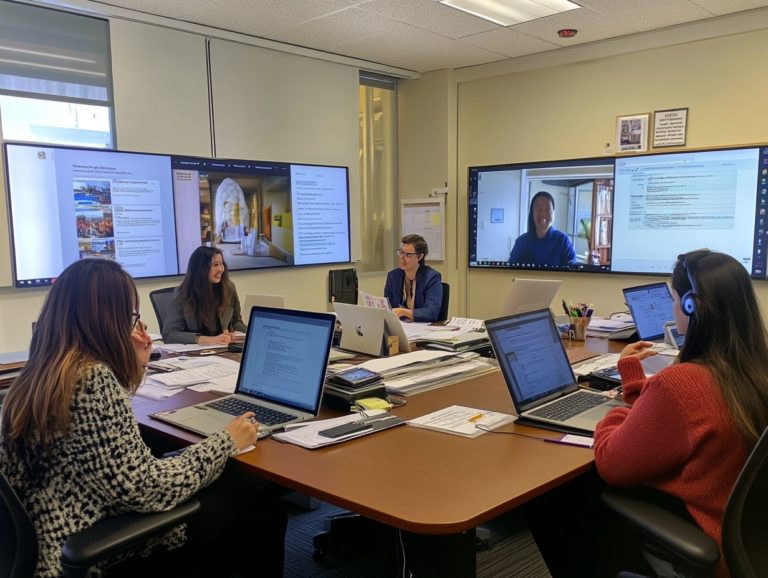Are Online Courses Recognized Globally?
The landscape of education is evolving at an astonishing pace, with online courses now taking center stage. Whether you aim to upskill, switch careers, or delve into new interests, the options are both vast and diverse.
This article is your essential guide to the rising world of online education. Get ready to explore the immense benefits that await you!
You ll uncover tips for selecting accredited courses that align with your career aspirations. Dive in to discover how online education can truly transform your learning experience.
Contents
- Key Takeaways:
- The Rise of Online Education
- Global Recognition of Online Courses
- Benefits of Online Education
- Challenges You Might Face
- Tips for Choosing a Recognized Online Course
- Frequently Asked Questions
- Are online courses recognized globally?
- What factors determine the recognition of online courses?
- Do all online courses offer recognized certifications?
- Can online courses be used for professional development?
- Are online courses recognized by traditional universities?
- Are there any limitations to the acceptance of online courses?
Key Takeaways:

Online courses are recognized globally by institutions and employers. This makes them a great choice for advancing your education and career.
Flexibility, accessibility, and cost-effectiveness are major benefits that contribute to their global recognition.
When choosing an online course, it is important to research official recognition and reputation, as well as consider your career goals, to ensure its recognition and relevance in the global job market.
The Rise of Online Education
The rise of online education has transformed the learning landscape. It now offers greater accessibility and flexibility than ever.
Free online courses from institutions like Harvard University have surged in popularity, especially during the COVID-19 pandemic.
As the demand for skills that enhance your CV continues to grow, online learning experiences are adapting to cater to a diverse range of learners. This ultimately improves your employment prospects across various sectors.
Overview of Online Courses
Online courses have transformed the landscape of education, presenting you with an abundance of options from esteemed institutions like Harvard University and platforms such as FutureLearn and Udacity all at your fingertips, and many are even free.
These flexible learning opportunities cater to your diverse interests, allowing you to delve into critical subjects like the effects of climate change, which are ever more pertinent in today s world.
Courses in moral and political philosophy invite you to develop a nuanced understanding of ethical frameworks and civic responsibilities. They encourage you to think critically about the complexities of society.
For those of you aiming to thrive in today s dynamic environment, innovative leadership programs are designed to equip you with the skills necessary to inspire teams and drive meaningful change.
The accessibility and diversity of online education not only enhance your learning experience but also cultivate a global exchange of ideas and knowledge, enabling you to connect with fellow learners from all walks of life.
Global Recognition of Online Courses
The global recognition of online courses has seen a remarkable surge, as countless higher education institutions now acknowledge the credibility and intrinsic value of these programs.
When accredited by reputable bodies, online courses gain a level of legitimacy that can significantly enhance your employment prospects upon graduation. Esteemed organizations like the International Labour Organization and the International Monetary Fund are increasingly recognizing the importance of the skills you acquire through online learning.
Official Recognition and Institutions
Official recognition by respected colleges is crucial for ensuring the quality of online courses. These distinctions provide you with the reassurance that your educational investment holds significant value.
In today s digital landscape, the role of these institutions goes far beyond mere endorsement; they actively participate in shaping curricula that meet global standards of excellence. This becomes especially vital when considering the impact of international organizations, such as the United Nations and its various agencies.
These entities advocate for educational initiatives that drive economic and social development, highlighting the importance of accredited online education that aligns with their comprehensive framework for sustainable progress.
By establishing benchmarks, these organizations create a reliable pathway for you as a student, ensuring that the education you pursue is not only recognized but also globally relevant.
Employer Acceptance

Employer acceptance of online education has surged dramatically. Many companies now recognize that the skills acquired through recognized online courses hold the same value as traditional degrees.
This shift is particularly noticeable in sectors like technology and digital marketing, where practical skills often eclipse formal educational credentials. For instance, tech giants such as Google and IBM are now on the hunt for talent based on skills gained from platforms like Coursera and Udacity. This marks a significant transformation in hiring practices.
Popular free courses from platforms like edX and Khan Academy are changing the landscape of accepted qualifications. They enable candidates from various backgrounds to effectively showcase their abilities.
As industries continue to evolve, the focus on adaptable skill sets and lifelong learning becomes increasingly vital. This further reinforces the legitimacy of online education.
Benefits of Online Education
Online education opens up a world of opportunities, offering unmatched flexibility and accessibility. You can customize your study schedule around your personal and professional commitments while accessing an extensive range of resources.
Flexibility and Accessibility
One standout feature of online education is its remarkable flexibility. You can access courses and materials from virtually anywhere, at any time.
This adaptability is especially empowering for individuals who may encounter challenges, such as those with disabilities or those balancing family and work demands. You have the freedom to choose when to engage with content, personalizing your educational journey.
For example, platforms like Coursera and edX offer an impressive range of free online courses, spanning topics from programming to creative arts. Quality education is within your reach!
These courses often come equipped with subtitles and alternative formats, making participation easy for everyone. This approach creates a vibrant learning environment where everyone can thrive don t miss out!
Cost-Effectiveness
Cost-effectiveness is a significant advantage of online education. Many reputable institutions offer free online courses, effectively removing financial barriers to quality learning.
This flexibility enables you to set your own pace and allocate resources more efficiently. A report from the Online Learning Consortium shows that students engaging in online courses often save significantly on educational expenses.
A case study from a prominent university found that over 70% of participants in free online courses successfully enhanced their skill sets without accumulating debt. These insights highlight how online learning not only paves affordable paths to knowledge but also nurtures economic independence and growth for a diverse array of learners.
Challenges You Might Face
While online education offers numerous advantages, it also presents various challenges and concerns that you should be aware of.
A key issue revolves around the quality and credibility of courses. This can significantly influence your engagement and overall satisfaction as a student.
Quality and Credibility

Quality and credibility are paramount in online education. You seek assurance that the courses you choose meet the standards set by accredited institutions.
This assurance typically arises from rigorous accreditation processes that scrutinize the curriculum, faculty qualifications, and institutional resources. Forming partnerships with recognized organizations can significantly enhance a program s reputation, giving you added confidence in your choices.
Without such credibility, you could face considerable setbacks, including wasted time and financial resources, which ultimately impacts your career prospects and motivation.
As you navigate the vast online landscape, it becomes essential to ensure that the programs you select convey authenticity and recognition. This will pave the way for your desired educational outcomes.
Start exploring online courses today and see how they can transform your career!
Student Engagement and Support
Engaging students in online courses can be a challenge. It requires strong support systems and interactive learning experiences to build a sense of community and motivation.
To overcome these challenges, you can use various strategies that enhance the online experience and foster connections among learners.
For example, mentorship programs create valuable relationships between students and instructors. These programs offer guidance and encouragement throughout the educational journey.
Additionally, support services addressing academic, emotional, and technical needs can boost student confidence.
Integrating online safety courses is also vital. This ensures that participants feel secure, allowing them to focus on their studies without worrying about online threats.
Tips for Choosing a Recognized Online Course
When selecting a reputable online course, consider these important factors:
- Research the accreditation of the program, as it impacts the quality and recognition of your learning experience.
- Ensure the course aligns with your career goals to maximize your educational investment.
Researching Accreditation and Reputation
Researching accreditation and reputation is crucial for ensuring that your education meets industry standards and enhances your career prospects.
Start by examining the affiliations of course providers. Accredited institutions usually maintain higher program quality.
Look into reviews and testimonials from former students to gain insights into the course’s overall value and learning experience.
Engage with online forums and educational platforms to discover firsthand accounts of how these programs are viewed in the job market.
Choosing courses from recognized and reputable institutions not only validates your education but also boosts your employability.
Considering Your Career Goals
Aligning your online course choices with your career goals is essential for enhancing your CV and improving employment prospects.
Identify your professional aspirations and the skills needed in your field. For example, if you’re interested in data analytics, seek programs covering statistical analysis or data visualization tools.
If sustainable development intrigues you, look for courses in environmental science or project management.
By focusing on these interests and skills, you can choose targeted online programs that enrich your knowledge while aligning with job market demands.
Frequently Asked Questions

Are online courses recognized globally?
Yes, many online courses are recognized globally by universities, employers, and professional organizations.
What factors determine the recognition of online courses?
Recognition depends on the accreditation of the institution, the quality of the curriculum and instruction, and the institution’s reputation.
Do all online courses offer recognized certifications?
No, not all online courses offer recognized certifications. It’s important to research the accreditation and reputation of the institution before enrolling.
Can online courses be used for professional development?
Yes, many online courses are designed for professional development and are recognized by employers and professional organizations.
Are online courses recognized by traditional universities?
Yes, many traditional universities now offer online courses and recognize those from other institutions, provided they meet the necessary criteria for recognition.
Explore online courses today to enhance your skills and career prospects. Share your thoughts below!
Are there any limitations to the acceptance of online courses?
Many online courses are accepted worldwide. However, there can be limitations based on the industry or country.
It’s crucial to research the specific requirements for acceptance in your field or desired location.






